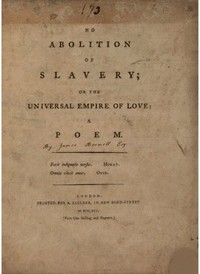No Abolition of Slavery by James Boswell
"No Abolition of Slavery; or the Universal Empire of Love" by James Boswell is a poem penned in the late 18th century. This literary work addresses the contentious issue of slavery, specifically focusing on the arguments against its abolition in Britain. The poem engages with political rhetoric of the time, showcasing the author's stance on the relationship between slavery and the perceived benefits it provides to individuals involved, particularly in the context
of the West Indies. In this poem, Boswell employs satire and personal commentary to critique the abolitionist movement and those advocating for the rights of enslaved individuals. The poem juxtaposes the conditions of enslaved Africans with the hardships faced by the lower classes in Britain, implying that both groups experience suffering in different forms. Through vivid imagery and various character portrayals, the poet ultimately argues for the continuation of slavery, underlining the complicity of love and desire in human hierarchies. The result is a complex exploration of power, social structure, and love, casting a controversial light on a deeply divisive topic of the era. (This is an automatically generated summary.)
Read or download for free
| How to read | Url | Size | |||
|---|---|---|---|---|---|
| Read now! | https://www.gutenberg.org/ebooks/20360.html.images | 66 kB | |||
| EPUB3 (E-readers incl. Send-to-Kindle) | https://www.gutenberg.org/ebooks/20360.epub3.images | 113 kB | |||
| EPUB (older E-readers) | https://www.gutenberg.org/ebooks/20360.epub.images | 112 kB | |||
| EPUB (no images, older E-readers) | https://www.gutenberg.org/ebooks/20360.epub.noimages | 52 kB | |||
| Kindle | https://www.gutenberg.org/ebooks/20360.kf8.images | 172 kB | |||
| older Kindles | https://www.gutenberg.org/ebooks/20360.kindle.images | 181 kB | |||
| Plain Text UTF-8 | https://www.gutenberg.org/ebooks/20360.txt.utf-8 | 40 kB | |||
| Download HTML (zip) | https://www.gutenberg.org/cache/epub/20360/pg20360-h.zip | 108 kB | |||
| There may be more files related to this item. | |||||
Similar Books
About this eBook
| Author | Boswell, James, 1740-1795 |
|---|---|
| Title |
No Abolition of Slavery Or the Universal Empire of Love, A poem |
| Note | Reading ease score: 65.8 (8th & 9th grade). Neither easy nor difficult to read. |
| Credits |
Produced by Bryan Ness, Louise Pryor and the Online Distributed Proofreading Team at http://www.pgdp.net (This book was produced from scanned images of public domain material from the Google Print project.) |
| Language | English |
| LoC Class | PR: Language and Literatures: English literature |
| Subject | Slavery -- Poetry -- Early works to 1800 |
| Category | Text |
| EBook-No. | 20360 |
| Release Date | Jan 15, 2007 |
| Copyright Status | Public domain in the USA. |
| Downloads | 91 downloads in the last 30 days. |
| Project Gutenberg eBooks are always free! | |

